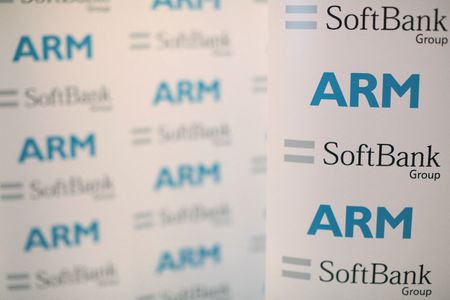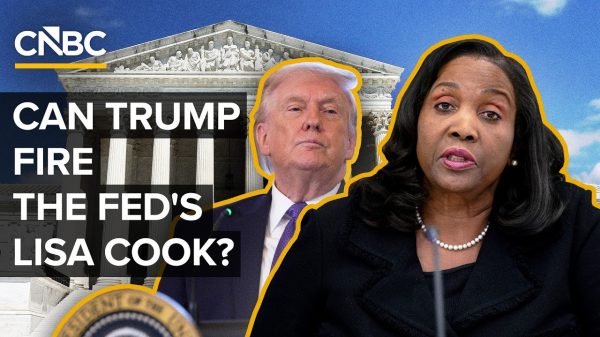By Louis Juricic and Sarina Isaacs
Investing.com — Here is your weekly Pro Recap on the biggest headlines out of a big earnings week for tech: Arm’s big debut, Apple’s new iPhone, Qualcomm’s Apple pact, Oracle’s disappointment, and an AI-driven Tesla upgrade.
InvestingPro subscribers get tech headlines like these in real time. Never miss another market-moving alert.
Softbank’s Arm Holdings
Chip design unit Arm Holdings (NASDAQ:) saw a heavily oversubscribed IPO in US markets Thursday, with its valuation also racing past initial projections.
Shares of Arm, a unit of Japanese tech conglomerate SoftBank (TYO:) (OTC:), surged some 25% to $63.59 on their first day of trade in the US, making for about a $65 billion market cap – far higher than the $54B valuation projected in the offering.
Gains spilled over into Softbank’s Tokyo shares Friday, which closed the session up 2.1% to 6,718 yen. In New York, Softbank ADRs ticked 0.9% higher on Thursday before retreating 2.4% on Friday. Softbank retains 90% ownership of the company.
The Arm debut is the year’s biggest, and saw many of the chip designer’s biggest clients participating as cornerstone investors. Apple (NASDAQ:, Nvidia (NASDAQ:), and Alphabet (NASDAQ:) (NASDAQ:) were among the biggest investors in the firm.
Arm’s listing marks the close of a long-running attempt by Softbank to cash out on the chip designer. The conglomerate had agreed to sell Arm to Nvidia for $40B in 2021, although the plan was scuttled due to regulatory hurdles.
Demand for Arm’s IPO was also largely underpinned by growing optimism over an AI boom this year, which chipmakers such as Nvidia predict will fuel a major bump in chip demand over the coming years.
Apple iPhones titanium
Apple (NASDAQ:) launched its iPhone 15 and 15 Plus models last Tuesday, as well as the higher-end iPhone 15 Pro and Pro Max.
Apple also unveiled new Apple Watch constructed with 95% titanium and boasting 72 hours of battery life.
The Pro Max – the most expensive of the new iPhones – went on sale for pre-orders on Friday, and initial delivery times for the model slipped into October, according to Bloomberg, suggesting strong demand.
The potentially strong demand is a positive for investors, with concerns emerging in recent weeks regarding overall iPhone demand, particularly regarding the consumer appetite for Apple iPhones in China following the launch of Huawei’s new smartphone.
Following the event, Morgan Stanley noted that China risk “continues to dominate investor conversations,” but added, “We still believe there is upside to FY24 expectations.”
Goldman Sachs, for its part, said:
“Although the product announcements and key features were largely as expected, price increases on iPhone were lower-than-expected… We’re encouraged by Apple’s continued investments into the Apple ecosystem and US carrier promotions for the iPhone continue to be supportive of demand.”
Shares of Apple slipped 2.9% for the week to $175.01.
Qualcomm signs with Apple
A day earlier, and in other Apple-related news, Qualcomm Incorporated (NASDAQ:) said that it had secured an agreement to provide its high-end chips for Apple iPhones to be launched from 2024 through 2026
Shares in the chipmaker jumped nearly 4% on the announcement.
After the announcement, Deutsche Bank maintained its a Hold rating and $120.00 price target on Qualcomm, noting that the development is “clearly a positive for QCOM, with eventual AAPL loss now not expected until 2026 at the earliest (vs. prior expectations of 2024).”
The analysts said the estimate the total associated opportunity to come to some $9B a year.
“Overall, this announcement highlights the true value QCOM’s superior technology, and we agree the stock should rise in response,” said Deutsche, while adding that they are reiterating the Hold rating in part due to “ongoing pressures in the total smartphone market and the potential for only incremental opex improvements now that AAPL biz must be maintained.”
Shares ended 1.7% higher for the week.

Oracle revenue
Oracle (NYSE:) shares plunged more than 13% on Tuesday after management offered a weak outlook for the second quarter on its fiscal first-quarter earnings call.
Q1 results beat analysts’ forecasts, reporting earnings per share of $1.19 vs. the expected $1.15 and $12.45B in sales, given boosted demand for cloud services amid an ongoing push to develop generative AI apps.
But on the call, Oracle said it sees total revenue growing 5% to 7% at today’s currency rates and 3% to 5% in constant currency. Cloud revenue is seen growing at 28% in constant currency, below the 29% reported for Q1. Oracle attributed the soft cloud outlook to the accelerated transition of its Cerner (NASDAQ:) unit to the cloud.
Adjusted EPS is seen at $1.29 (up or down 2 cents), above the $1.25 consensus.
Goldman Sachs said the company’s Q2 outlook “fell short of lofty expectations.”
“While the print/guide is unlikely to dissuade bulls, we see the current risk/reward skew as balanced in lieu of upside to near-term expects given an already demanding valuation profile,” Rangan wrote in a note.
For Guggenheim, however, the Oracle bullish thesis remains intact:
“We see little risk in achieving F2Q goals, especially given the $1.5B in bookings in the first week of the quarter. Do these results change our thesis on ORCL? No. We continue to believe that the three legs of growth either still have much to go (SaaS), are at a very early stage (OCI), or are only just beginning (On Prem database migration to the Cloud). We reiterate ORCL as Buy rated and our Best Idea.”
Shares ended the week at $113.91, down more than 10% for the five sessions.
Tesla upgraded
Tesla (NASDAQ:) soared 10% Monday on word of an upgrade to Overweight from Morgan Stanley, whose analysts said the stock can surge thanks to its Dojo Supercomputer.
Tesla stock is also a new Top Pick at Morgan Stanley with a price target of $400 per share, a new Street high.
The analysts wrote in a new to clients that the company’s “advanced supercomputing architecture… pushes new boundaries in custom silicon and may put Tesla at an asymmetric advantage in a $10trn TAM.”
The analysts liken Tesla to Amazon (NASDAQ:) after the e-commerce titan’s AWS was able to reach 70% of the company’s total earnings before interest and taxes (EBIT), and says Dojo can add up to $500B to Tesla’s enterprise value.
Tesla created Dojo, a dedicated supercomputer, to enhance and train its Full Self-Driving (FSD) system. Tesla’s vehicles are equipped with numerous sensors and must make critical real-time decisions in unpredictable driving conditions.
“While it is difficult to explicitly validate the many claims Tesla has made about Dojo’s cost and performance, we believe Tesla has a chance of bringing forth a competitive customized solution given the company’s innovation track record and capabilities,” Morgan Stanley further noted.
Year to date, Tesla shares are up over 150% to $274.39.
Sam Boughedda, Yasin Ebrahim, Senad Karaahmetovic, and Ambar Warrick contributed to this report.

Read the full article here












